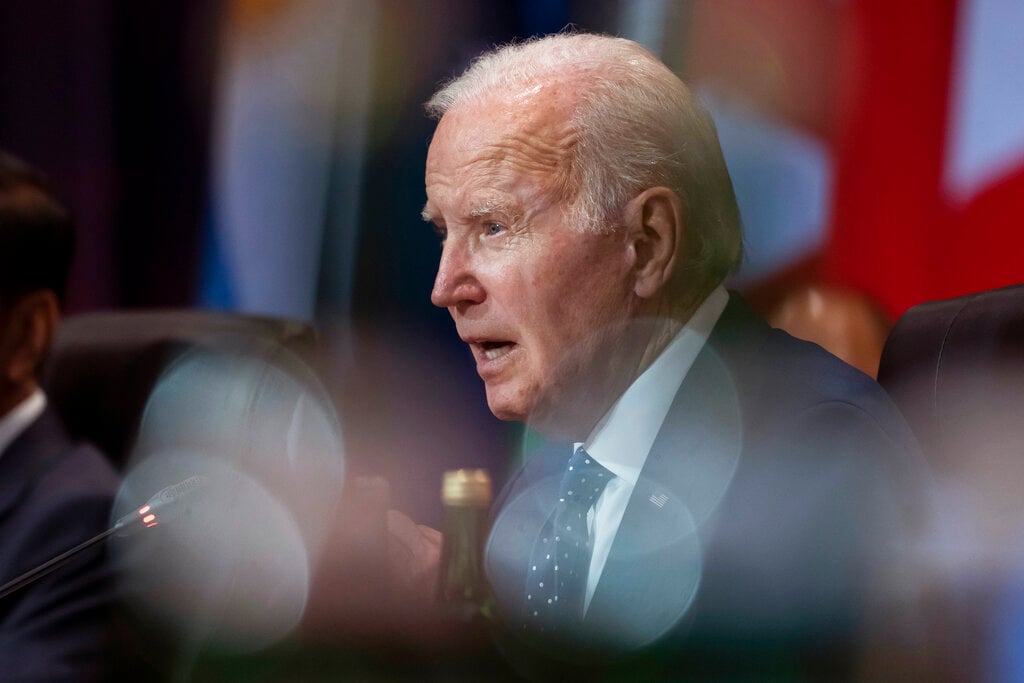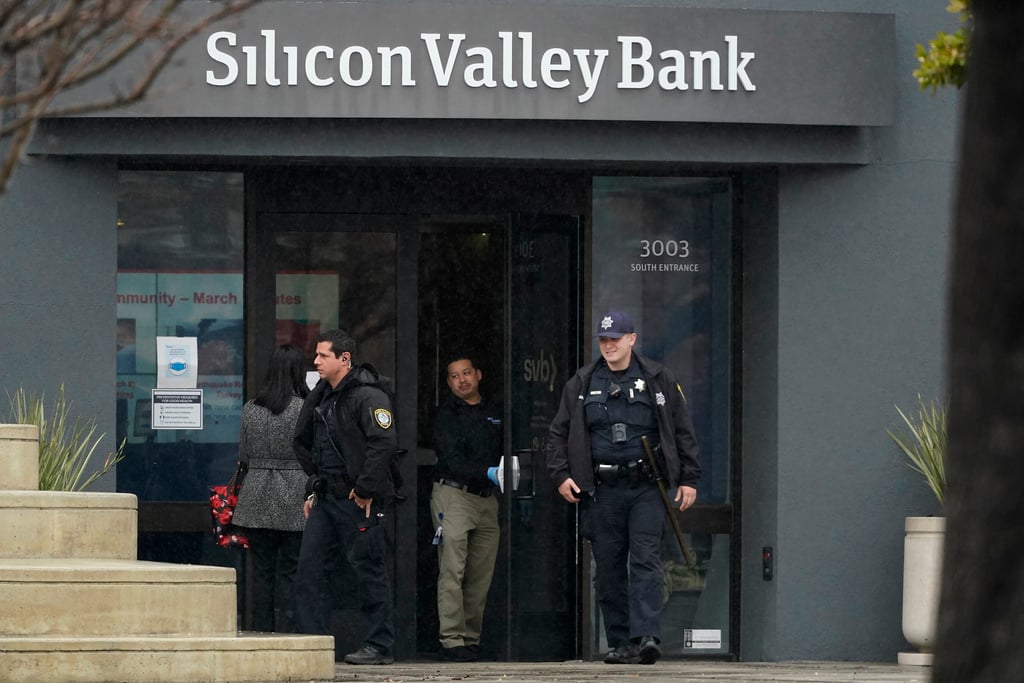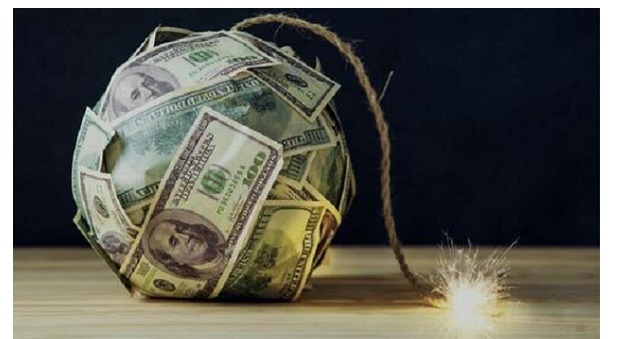FEARS OF CONTAGION RISE – DESPITE ‘TOO LITTLE, TOO LATE’ BIDEN PLEDGING ‘WHATEVER NEEDED’ – BANK STOCKS CONTINUE THEIR BLOODBATH AS SVB MARKET TURMOIL SPREADS
Biden pledges ‘whatever needed’ amid bank fears
His attempt to reassure markets follows the collapses of two lenders.
SINGAPORE: US president Joe Biden vowed to do whatever was needed to address a threatened banking crisis after the collapses of Silicon Valley Bank and Signature Bank forced regulators to step in with emergency measures.
Biden’s attempt to reassure markets and depositors came after weekend moves by the US to guarantee deposits at collapsed tech-focused lender SVB failed to persuade investors that other banks around the world were healthy.
Trading in the stocks was halted several times due to volatility.
The SVB shockwaves were felt in Europe too, where the STOXX banking index was down 6.3% in its largest one-day fall in more than a year.
 US president Joe Biden will ask Congress and regulators to strengthen bank rules. (AP pic)
US president Joe Biden will ask Congress and regulators to strengthen bank rules. (AP pic)
Germany’s Commerzbank fell as much as 12.7%, while Credit Suisse hit a new record low after falling 15%.
Swiss financial regulator Finma said it was closely monitoring the banks and insurers it oversees and looking for signs of contagion from the collapse of SVB and Signature.
Biden said his administration’s rapid action over the weekend should reassure Americans that the US banking system is safe, adding that he was going to ask Congress and regulators to strengthen bank rules.
“Americans can have confidence that the banking system is safe. Your deposits will be there when you need them.”
In the money markets, a closely-watched indicator of credit risk in the US banking system edged up, as did other indicators of credit risk in the euro zone. Europe’s volatility index jumped to its highest level since October 2022.
“When a step (is taken) this big, this quickly, your first thought is ‘crisis averted’. But your second thought is, how big was that crisis, how big were the risks that this step had to be taken?” said Rick Meckler, partner at Cherry Lane Investments.
The price of gold meanwhile raced towards the key US$1,900 level, emboldened by bets that the US Federal Reserve may have to tone down its rate hikes as investors sought safe havens.
“There is a sense of contagion and where we see a re-pricing around financials is leading to a re-pricing across markets,” said Mark Dowding, chief investment officer at BlueBay Asset Management in London.
Dowding said he did not think that a lot of the issues affecting US banks would be present in European lenders.
Bonds held by SVB were “worth next to nothing in a short space of time, so against that backdrop, that has an effect that is translated on a more widespread basis”, he added.
US regulators yesterday stepped in after the collapse of SVB – the largest US bank failure since 2008, which suffered a run after a big hit on a portfolio of bonds.
SVB’s customers will have access to all their deposits starting today and regulators set up a new facility to give banks access to emergency funds.
The Federal Reserve also made it easier for banks to borrow from it in emergencies.
Regulators moved swiftly too to close New York’s Signature Bank, which had come under pressure in recent days.
European fallout

In Germany, the central bank convened its crisis team today to assess the possible fallout on the local market, even as no emergency action was foreseen in Europe.
After marathon weekend talks, early today in London HSBC said it was buying the British arm of SVB for £1.
It said SVB UK had loans of around £5.5 billion and deposits of around £6.7 billion as of March 10.
While SVB UK is small – HSBC’s balance sheet exceeds US$2.9 trillion – concerns that SVB’s failure would cause Britain’s startup industry to seize up had prompted calls from the sector for government intervention.
Markets gyrate
Meanwhile, a furious race to re-price interest rate expectations also sent waves through markets as investors bet the Fed will be reluctant to hike next week.
Traders currently see a 50% chance of no rate hike at the Fed’s meeting next week, with rate cuts priced in for the second half of the year.
Earlier last week a 25 basis point hike was fully priced in, with a 70% chance seen of 50 basis points.
Two-year US treasury yields were last down 55bps at around 4.09% set for their biggest one day fall since 1987 according to Refinitiv data.
SVB’s collapse comes alongside the closure of crypto-focused bank Silvergate, which last week disclosed plans to wind down operations and voluntarily liquidate, in the aftermath of FTX’s implosion last year.
US banks lost more than US$100 billion in stock market value late last week following SVB’s failure, while European banks have now lost a similar amount, a Reuters calculation showed. REUTERS
Bank stocks plunge resumes as SVB market turmoil continues
SINGAPORE/LONDON: Global banking shares plunged on Monday as moves by the United States to guarantee deposits at collapsed tech-focused lender Silicon Valley Bank failed to reassure investors that other banks remain financially sound.
Europe’s STOXX banking index fell 5.8%, having shed 3.78% on Friday, leaving it on track for its biggest two-day fall since March 2022, soon after Russia invaded Ukraine.
Commerzbank AG fell as much as 12.7%, while Credit Suisse Group AG briefly hit a new record low after falling more than 15%.
U.S. banks also declined in pre-market trading, with Bank of America down 3.7%. Smaller lenders remained under pressure with privately owned First Republic Bank plunging around 60% and PacWest down around 40%.
Trading volumes were high, running at 160% of the one-month average for the EURO STOXX 50 according to a note seen by Reuters, while Europe’s volatility index jumped to its highest since October 2022.
“There is a sense of contagion and where we see a repricing around financials is leading to a repricing across markets,” said Mark Dowding, chief investment officer, BlueBay Asset Management in London. He said he did not think that a lot of the issues impacting U.S. banks would be manifested in European peers.
Bonds held by SVB were “worth next to nothing in a short space of time, so against that backdrop, that has an effect that is translated on a more widespread basis,” he added.
After a dramatic weekend, U.S. regulators on Sunday stepped in after the collapse of SVB – the largest U.S. bank failure since 2008, which suffered a run after a big hit on a portfolio of bonds.
SVB’s customers will have access to all their deposits starting Monday and regulators set up a new facility to give banks access to emergency funds. The Federal Reserve also made it easier for banks to borrow from it in emergencies.
Regulators moved swiftly too to close New York’s Signature Bank, which had come under pressure in recent days. But more stress is expected.
First Republic Bank said on Sunday it had secured additional financing through JPMorgan Chase, giving it access to a total of $70 billion in funds through various sources.
EUROPEAN FALLOUT
In Germany, the central bank convened its crisis team on Monday to assess the possible fallout on the local market, even as no emergency action was foreseen in Europe.
After marathon talks over the weekend, early on Monday in London HSBC announced it was buying Silicon Valley Bank UK, the British arm of SVB, for one pound ($1.21). It said the subsidiary had loans of around 5.5 billion pounds and deposits of around 6.7 billion pounds as of March 10.
While SVB UK is small – HSBC’s balance sheet exceeds $2.9 trillion – concerns that SVB’s failure would cause Britain’s start-up industry to seize up had prompted calls from the sector for government to intervene.
MARKETS GYRATE
Meanwhile, a furious race to re-price interest rate expectations also sent waves through markets as investors bet the Fed will be reluctant to hike next week while the mood is febrile and delicate.
Markets are now pricing in a roughly 40% chance that the U.S. central bank will not raise rates at all, according to the CME’s Fedwatch tool. Earlier last week a 25 basis point hike was fully priced in, with a 70% chance seen of 50 basis points.
Two-year U.S. Treasury yields were last down 55 bps at around 4.09% set for their biggest one day fall since 1987 according to Refinitiv data.
SVB’s collapse comes alongside the closure of crypto-focused bank Silvergate, which last week disclosed plans to wind down operations and voluntarily liquidate, in the aftermath of FTX’s implosion last year.
U.S. banks lost over $100 billion in stock market value late last week following SVB’s failure, while European banks have now lost a similar amount, according to a Reuters calculation. REUTERS
– Reuters
.
